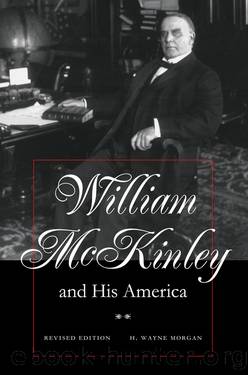William McKinley and His America by H. Wayne Morgan

Author:H. Wayne Morgan [Morgan, H. Wayne]
Language: eng
Format: epub
Tags: Biography, Biography & Autobiography, Reference, History, Politics
ISBN: 9780873387651
Google: B0Jr8Ypal1UC
Goodreads: 407162
Publisher: Kent State University Press
Published: 1963-01-01T00:00:00+00:00
CHAPTER 16
From Peace to War
HAVANA IN 1898 bore the marks of its divided character. To the casual visitor and tourist it was a charming, if inconvenient, city. From this seat of imperial power expeditions had set out to conquer an empire. In 1898 the city still boasted this air of grandeur, but now it was uneasy, sitting in the midst of a crumbling world, prey to fear as the conflict ate at Cubaâs vitals. Now within its confines stood not a conquering army but a garrison amid the rabble and misery that war bred, prey to disease, fearful of tomorrow. It shared the dubious honor of Spanish power with only one other major Cuban city, Santiago de Cuba.
Havana was not Madrid, nor were the attitudes of its people the same. Both its civil and military officials saw things in a different light from that which filtered through the instructions and correspondence from Spain. The military commander who undertook a Cuban responsibility often lost heart when he faced his command and surveyed the scene of battle. The civil administrator who determined to reform the island to save it for his country soon fell into laxness and defeatism on facing the islandâs bureaucracy. From the somewhat seedy but still ornate government palaces in Havana there issued edicts and pronouncements intended to change Cuba to American satisfaction, but they seldom impressed anyone.
Much of the problem was inherent. Spaniards born in the island ran the Cuban economy and political system. Loss of the island would mean loss of office to them. Their control over the fiscal system, the debt, and the economy in general would vanish. The Cuban Spaniards clung largely to the past, urging the captain-general, Marshal Blanco, to subdue the rebellion at once. Their opposition to insular reform, together with the rebelsâ manifest refusal to accept anything but independence, was the basis of Leeâs skepticism about autonomy, no matter what intentions motivated Madrid.
American pressure had only sharpened that sullen opposition during 1897, for the Spanish elements in Cuba were far more conscious of the âYankeesâ than was the government at home. On January 8, Lee reported that reconcentration seemed as bad as ever despite the new edicts against it. On that same day in Madrid, Woodford warned that âthe result must be wrought out in Cuba and by facts, rather than at Washington or Madrid and by negotiations.â1
As New Yearâs Day and the flurry of receptions which inaugurated 1898 passed, McKinley hoped for speedy results in instituting autonomy that would relieve the pressures upon him. He had assured many visitors during the holidays that he expected the first royal proclamations setting the autonomy scheme in motion to be issued on January 1. Lee was skeptical and his usual pessimistic cables flowed into the State Department and then into the presidentâs office. The sense of calm that presaged the storm broke on January 12 with reports from Lee and stories in the press describing anti-American riots in Havana, which elements opposed to autonomy led.
Download
This site does not store any files on its server. We only index and link to content provided by other sites. Please contact the content providers to delete copyright contents if any and email us, we'll remove relevant links or contents immediately.
The Hite Report on Shere Hite by Shere Hite(2046)
The One Percenter Encyclopedia by Bill Hayes(1811)
Benjamin Franklin: An American Life by Walter Isaacson(1723)
Benjamin Franklin : an American Life by Walter Isaacson(1503)
God Is Not Great by Christopher Hitchens(1308)
Book of Obituaries by Ann Wroe(1270)
Who's Who in the Age of Jesus by Geza Vermes(1221)
The Bloomsbury Encyclopedia of Philosophers in America From 1600 to the Present by Shook John R(1171)
On Sparta (Penguin Classics) by Plutarch(1170)
A Treasury of Royal Scandals by Michael Farquhar(1099)
Bloodletters and Badmen by Jay Robert Nash(1088)
Agatha Christie Murder in the Making by Agatha Christie & John Curran(1078)
Heroes by Paul Johnson(1043)
The Fortunate Pilgrim by Mario Puzo(1014)
A Dictionary of Political Biography by A Dictionary of Political Biography(1005)
Men in Dark Times by Hannah Arendt(985)
Stepping Stones by Dennis O'Driscoll(937)
Agatha Christie's Secret Notebooks by Agatha Christie & John Curran(931)
Devil May Care by Unknown(929)
